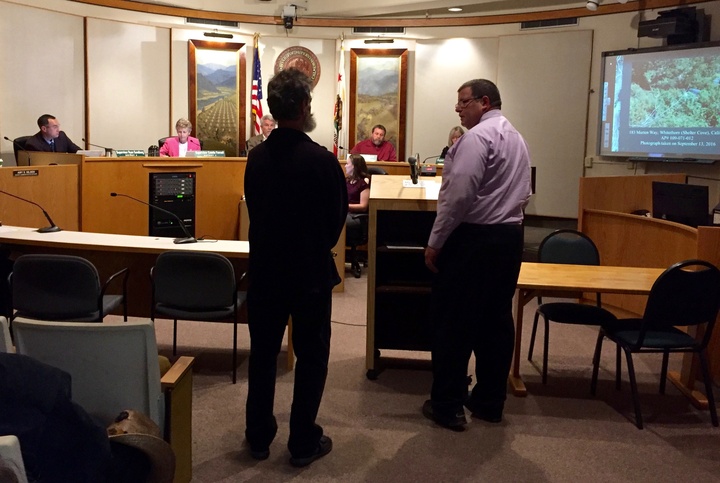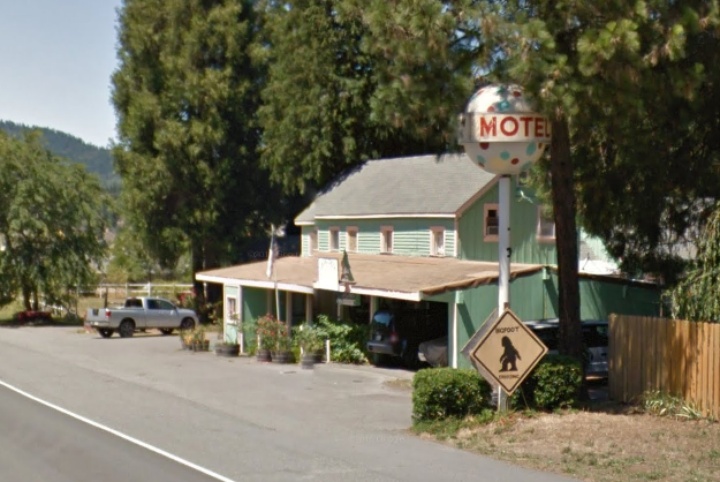
Humboldt County Code Enforcement Investigator Jeff Conner (at lectern) glances back at property owner Roger Lechner at Tuesday’s Board of Supervisors meeting. | Photo by Ryan Burns
The county’s code enforcement unit recently cited a pair of property owners for growing marijuana in a way that violates county code, and on Tuesday those property owners showed up at the Board of Supervisors meeting to appeal. Neither of them denied breaking the rules; instead they argued that the rules are simply unfair.
That argument failed to sway the supervisors, and the appeals were quickly and unanimously denied.
First up was Roger Lechner, a lanky, bearded man who was cited for growing weed on his tiny parcel down in Whitethorn. The problem with his grow, according to the county, is that his parcel doesn’t have a residence on it. and the Shelter Cove Resort Improvement District, which has jurisdiction in the area, requires medical marijuana grows to be located on a property with a residence.
Jeff Conner, an investigator with the Code Enforcement Unit, testified that Lechner had admitted to growing weed but denied a request to inspect the property. Lechner approached the lectern to state his case.
“I think that the law that was passed in Shelter Cove is unfair and was adopted according to procedures that were unlawful or unfair or whatever,” he said in a raspy voice. “I could go into a lot of details, which I won’t bore you with.” The gist of his argument was that the Shelter Cove Improvement District should never have passed the law requiring grows to occur only on properties with houses on them.
Board Chair Mark Lovelace told Lechner that the time to log that complaint was when the ordinance was being adopted.
“I agree with you that I am in violation,” Lechner said, but he added that he plans to continue growing his plants as “a matter of civil disobedience.” He went on decry the ugliness of neighboring properties with tall fences and the manners of people in his community, saying he’d much rather be “back east” where people talk to each other. But ultimately, he said, he plans to sidestep the whole issue by giving his parcel to a neighboring land owner who does have a house, so the grow will be perfectly legit.
Lovelace asked staff if that would really work, and Conner replied that as long as the same property owner holds adjacent properties, and as long as the grow is limited to 200 square feet of canopy, then the garden would be permitted.
Supervisor Estelle Fennell then pointed out that if the board denied the appeal, Lechner would only have 14 days to come into compliance. The options there seemed to include transferring ownership of the land to his neighbor, destroying his grow operation or building a house on the property. Fennell moved to adopt the resolution denying the appeal, Supervisor Ryan Sundberg quickly seconded and the motion passed 5-0.

The Willow Creek Motel, on State Route 96, houses a number of medical marijuana patients, according to the property owner. | Google Street View.
Next up was Ed Bush, owner of the Willow Creek Motel property (pictured above). Cited for exceeding the 200-square-foot limit on cultivation, Bush, like Lechner, admitted to violating county code but pleaded leniency on moral grounds.
Many of the residents at the property are legitimate medical marijuana patients and veterans like himself, Bush said, and yet Bush is the only one authorized to grow marijuana. He didn’t find that fair. Tenants have been growing their own weed on the property for as long as he’s owned it — roughly 10 years. “That’s why they rent from me,” he said.
Conner testified that there was nearly 5,000 square feet of canopy being cultivated at the property.
Fennell noted that in his letter requesting an appeal Bush asserted that he intends to apply for a commercial cultivation permit.
“I have applied,” Bush responded. But under further questioning it was determined that he’d merely registered as a grower and hadn’t yet applied for a permit. A woman accompanying Bush claimed that an adjacent 25 acres had been deeded to Bush, but Conner explained that even if Bush applied for a commercial cultivation permit in an effort to justify a grow as large as he’s had, the property would likely be ineligible since it’s zoned off-highway commercial.
Ultimately, Lovelace gave Bush the same response he’d given Lechner. “As with the previous item, I hear your questions, I hear your frustration and your own particular situation,” he said. But questions of legitimacy under the state’s Compassionate Use Act are “just not our purview,” he added. “We are not a medical board. We have no authority in determining who is or isn’t legitimate.” But the county does have authority over its own regulations, and Lovelace said Bush’s operation “appears clearly outside of [county] code.”
Bush said abatement won’t be a problem since he and his residents have already removed all of the plants.
Sundberg defended the county’s intentions in crafting the 2014 land use ordinance that established the current weed garden size limits of 100 square feet on properties of less than an acre and 200 square feet on properties between one and five acres. “We had to come up with something reasonable,” with size limits that reduced impacts to neighbors, Sundberg said.
Bush was agreeable but disheartened. “Things can change, can’t they?” he asked the board.
“Yes,” Sundberg quickly responded.
“Things always change,” Lovelace added.
Bush’s appeal was denied 5-0.
CLICK TO MANAGE